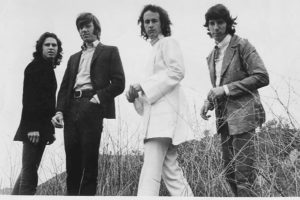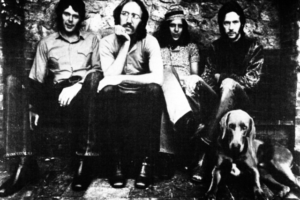
Feature Photo of John Lodge courtesy of Chipster PR
As a member of the Moody Blues, bassist John Lodge aided in the advent of both progressive and psychedelic rock, launching a record in Days of Future Passed that changed the game forever in one fell swoop.
Of course, Lodge couldn’t have known this then—especially given the tepid commercial response the Moody Blues has initially received. And by the looks of it, at the time, he didn’t care: “We never put any thought into whether Days of Future Passed would be successful,” Lodge tells Classic Rock History. “All that came later, and once it did, it felt like such an amazing accomplishment.”
Thinking back on the lifestyle change that success afforded, Lodge says, “Before we released Days of Future Passed, we were playing a lot of cover songs. We were forced to play popular songs from America, like rock and blues songs from the Delta, even though we’d never even been to America.”
He continues, “We had no in-depth knowledge of this music, yet we were playing it [laughs]. But Days of Future Passed was our music. I understood it. I knew what we were trying to do. To this day, I am still proud of what we achieved with that album.”
And why shouldn’t he be proud? Some 56 years after its release, Days of Future Passed stands not only as the Moody Blues’ first platinum record but also as an album that, in many ways, defined a generation of listeners’ perception of where the boundaries of rock music lay.
When asked if he knew they were onto something, Lodge says, “I think we were aware that what we were doing was different. Remember, Days of Future Passed was mixed in stereo, which was very usual in England at the time because very few people had the right equipment to do that. Most people at home had mono machines instead of stereo, and then there was AM radio, which didn’t play albums like that.”
All these years later, Lodge is still waving the flag, as he’s just gotten off yet another successful American tour, where he and his band have been playing Days of Future Passed in full.
Though he might not have thought it as a young man, now, at the age of 78, Lodge is now painfully aware of the significance of what he helped create: “A lot of people grew up with that Days of Future Passed, along with our others, and in their own ways, they’re all fantastic.”
“Of course, some of those albums came during the days of punk music, which meant some people didn’t want to listen to the Moody Blues,” he laughs. “But looking back, I guess, if nothing else, Days of Future Passed is our most well-remembered, if not our most well-loved. And it does still give me a great sense of fulfillment.”

Feature Photo of John Lodge courtesy of Chipster PR
You’ve been playing Days of Future Passed in full while on tour lately. Tell me about the performances.
Oh, yes, I’ve been playing the album in full for the last year, and it’s been great fun. I decided it would be great to perform Days of Future Passed while touring America to bring the album to a new generation of young people. Before he passed, I had talked to Graeme Edge [Moody Blues drummer] and asked him to write and record some poetry for the Days of Future Passed tour so I could recite it on stage. I told him, “This way, you’ll always have a place on stage with me.”
I assume he was all for it.
Oh, he was. Graeme said, “John, it would be an honor to do it.” And I filmed him doing it, too. So, I’ve got a film of Graeme narrating his beautiful poetry, which means so much to me. And then, I’ve had John Davison from Yes join me on stage for a few songs, along with my band. It came together well, but we worked hard and rehearsed for months. We did 15 East Coast concerts and brought the performance to all of America over the summer.
What are your earliest memories of putting Days of Future Passed together?
In those days, recording sessions were tense because you’d have three or four sessions daily. And the record company [Decca/London] said, “We have a 24-hour lockdown on the studio,” which meant we could record anytime during the day if we wanted to. We could come in the middle of the night, in the morning, whenever the feeling came over us. I think we were the first artists to be given a full-on locked-out studio to do an album.
How long did it take to complete the album?
From the time we went into Decca Studios in Long, it took all of seven days. So, it took one whole week to record Days of Future Passed. And remember, we only had playback in the studio, but not in the control room, as we’d put great big speaker strips in the studio, and we’d proceed to stand there with each other, our girlfriends, radio presenters, and the record company so that we could play the album back in full.
And what were your first impressions?
I can only speak for myself but hearing that album in full was so mesmerizing. I knew the bass parts and the vocals were spot on, but hearing the guitars and drums with it was amazing. See, you don’t hear the full album until everyone is done contributing to it, so hearing the playback for the first time, to be honest, was entirely overwhelming. So much so that we had to play it back twice to ensure our ears were hearing it properly.
As I understand it, the Moody Blues were having financial difficulties due to a lack of commercial success. Was Days of Future Passed considered make or break?
Maybe to the record company, but not to us. We didn’t even think about the financials; we just wanted to produce an album we could be proud of. And once we’d heard it back, we said, “Right. That’s it, we’ve made it. We’ve made something we’re proud of.” After that, we let it go into the world, and it was up to those who heard it to decide if it was worth anything. Thankfully, people thought it was.

Feature Photo of John Lodge courtesy of Chipster PR
Can you remember recording “Nights in White Satin?”
I can’t remember recording it specifically, but I do know that after we recorded it, and when it was to have its wide release, we were sitting in BBC Studios in England and filled with anticipation. I remember the DJ hovering the needle over the record, about to debut it, and we were excited.
The station couldn’t play more than six records daily, so if you wanted to play a song, you had to go into the studios and record a version first. So, the first time people heard that song was the version we recorded in the studio. I remember sitting in the control room where we’d recorded it and listening back, thinking, “Wow… this is amazing. I can’t believe what we’ve just done here.”
Did that song’s success surprise you?
I don’t know about the rest of the band, but personally, it did. It was odd for the time because it was an over four-minute-long song at a time when shorter songs were popular in England. Back then, you could only get a record into rotation if it was under three minutes. And it had to be a ballad or an up-tempo song, so “Nights in White Satin” was against all odds for radio play in England.
How do you measure the success of “Nights in White Satin” and Days of Future Passed overall?
Oh my, those seven days spent recording that album were the seven days that completely changed my life. As a matter of fact, they changed a lot of people’s lives. That album gave us the early foundation for who we were and what we’d become. Even the critics at the time said, “This is a great album,” which meant a lot.
Can you put your finger on what made the album special?
The songwriting was great, and we played well. But the orchestra played an immense part in the success of Days of Future Passed. But after that, we didn’t use them, instead saying, “Let’s go into the studio and record every instrument ourselves,” which we did, starting with the follow-up to Days of Future Passed, In Search of the Lost Chord.
I remember having to buy a whole book on how to play oboe and French horn [laughs]. We had to study up to be able to play all those instruments ourselves and record an entire album. But we did it all on our own, which was motivated by not handling that part on Days of Future Passed.
Could you have imagined that you were assisting in the advent of prog and psychedelic rock?
We knew it was a different album, and we went as far as to say to each other, “We don’t want to go the safe route. Let’s be different.” We did that and recorded a long album in which each song relates to each other. We didn’t know we were helping invent concept records or prog, but there’s no denying that what came afterward obviously branched off what we’d been doing. But the prog rock tree is vast, and the roots of progressive rock are far and wide, so while the Moody Blues were important, it wasn’t all us.
Do you feel Days of Future Passed is the Moody Blues’ best record?
I don’t know. I like all the albums we did. Each record we made had a different meaning, and they all meant something different to each person. It’s like your children; how do you choose? [laughs]. So, yes, Days of Future Passed is essential, but so are the records that came after. Is it our best record? I don’t know. But it has meant a lot to many people, so it still means a lot to me. That’s one of the many reasons I’ve been playing it live, and I plan to continue to do so. But I can tell you this—I’m glad it happened, as it absolutely changed my life.

Feature Photo of John Lodge courtesy of Chipster PR
An Interview With John Lodge Of The Moody Blues article published on Classic RockHistory.com© 2023
Classicrockhistory.com claims ownership of all its original content and Intellectual property under United States Copyright laws and those of all other foreign countries. No one person, business, or organization is allowed to re-publish any of our original content anywhere on the web or in print without our permission. All photos used are either public domain Creative Commons photos or licensed officially from Shutterstock under license with ClassicRockHistory.com. All photo credits have been placed at the end of the article. Album Cover Photos are affiliate links and the property of Amazon and are stored on the Amazon server. Any theft of our content will be met with swift legal action against the infringing websites.





































